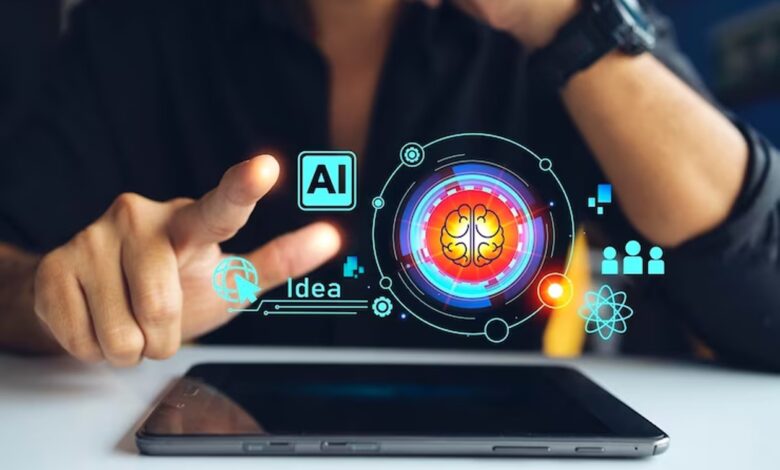7 Best AI Marketing Tools and Tips for Your AI Marketing Strategy

In the ever-evolving landscape of digital marketing, businesses are constantly seeking innovative strategies to gain a competitive edge. One such strategy that has gained immense popularity in recent years is the incorporation of Artificial Intelligence (AI) into marketing efforts. In this article, we will delve deep into the realm of AI marketing tools and provide valuable tips to boost your AI marketing strategy.
Understanding AI Marketing
In the rapidly evolving world of digital marketing, the integration of Artificial Intelligence (AI) has emerged as a game-changer. AI marketing is not just a buzzword; it’s a strategic approach that can significantly impact the way businesses engage with their audience, analyze data, and optimize marketing campaigns.
AI marketing, in its essence, involves leveraging artificial intelligence technologies and algorithms to streamline and enhance various facets of marketing. This innovative approach enables marketers to work smarter, not harder, by harnessing the power of data-driven decision-making, personalization, and automation.
The Importance of AI in Marketing
Incorporating AI into marketing strategies is not a choice but a necessity in today’s competitive landscape. The capabilities of AI have opened new doors for marketers, enabling them to:
- Process Vast Amounts of Data: AI can quickly process and analyze extensive datasets, providing insights that were once unimaginable.
- Make Data-Driven Decisions: Marketers can rely on AI-driven data analysis to make informed choices based on real-time information.
- Understand Consumer Behavior: AI tools allow for a deep understanding of consumer behavior, helping businesses tailor their strategies to match their audience’s preferences.
- Deliver Personalized Content: AI empowers marketers to provide highly personalized content to individual consumers, fostering stronger connections.
- Optimize Advertising Campaigns: AI can refine advertising campaigns, ensuring that the right message reaches the right audience at the right time.
- Cost Reduction: Efficient resource allocation, thanks to AI, can lead to significant cost savings.
- Competitive Advantage: Adopting AI marketing strategies allows businesses to stay ahead in the highly competitive digital marketing landscape.
The benefits of AI marketing are not limited to large enterprises; businesses of all sizes can leverage these advantages to boost their marketing efforts.
In this article, we’ll delve deeper into the world of AI marketing. We will explore the top AI marketing tools, provide practical tips for incorporating AI into your marketing strategy, and discuss the future of AI in marketing. By the end, you’ll have a comprehensive understanding of how AI can revolutionize your marketing efforts.
Let’s dive into the realm of AI marketing and discover how these technologies are reshaping the future of digital marketing.
Read More: 7 Best AI Software to Jump-start Your Stock Trading Career
The Importance of AI in Marketing
AI plays a pivotal role in modern marketing due to its ability to process vast amounts of data swiftly and accurately. It empowers marketers to make data-driven decisions, understand consumer behavior, and deliver highly personalized content.
Benefits of AI Marketing Tools
AI marketing tools offer a wide array of benefits, such as:
- Enhanced Efficiency: Automation of repetitive tasks.
- Improved Personalization: Tailoring content to individual preferences.
- Data-Backed Insights: Gaining deep insights into customer behavior.
- Optimized Ad Campaigns: Ensuring ads reach the right audience.
- Cost Reduction: Efficient allocation of resources.
- Competitive Advantage: Staying ahead in the digital marketing game.
Top 7 AI Marketing Tools
Let’s explore the top seven AI marketing tools that can transform your marketing strategy:
HubSpot
HubSpot is a comprehensive inbound marketing and sales platform that uses AI to automate marketing tasks, manage leads, and provide analytics for better decision-making.
Mailchimp
Mailchimp employs AI to personalize email marketing campaigns and provide insights for improving email open rates and click-through rates.
Marketo
Marketo offers AI-powered marketing automation solutions that help in lead management, lead scoring, and campaign optimization.
Pardot
Pardot, a part of Salesforce, employs AI to automate B2B marketing processes, including lead nurturing and scoring.
Canva
Canva utilizes AI to assist in graphic design, making it easier to create visually appealing content for marketing campaigns.
Hootsuite
Hootsuite integrates AI for social media management, allowing businesses to schedule posts and track engagement effectively.
Google Analytics
Google Analytics harnesses AI to provide in-depth insights into website traffic, user behavior, and campaign performance.
How to Incorporate AI into Your Marketing Strategy
To effectively incorporate AI into your marketing strategy, consider the following steps:
- Identify Goals: Determine what you want to achieve with AI.
- Select the Right Tools: Choose AI tools that align with your goals.
- Data Integration: Ensure seamless integration of AI into your existing data.
- Staff Training: Train your team to work with AI tools effectively.
- Continuous Monitoring: Regularly analyze results and make adjustments as necessary.
Tips for Implementing AI in Your Marketing
To make the most of AI in marketing, follow these essential tips:
Data Analysis
Leverage AI for in-depth data analysis, helping you understand customer behavior and preferences.
Personalization
Create personalized experiences for your customers, as AI can help tailor content and product recommendations.
Customer Insights
Use AI to gain valuable insights into your target audience, allowing for better targeting and messaging.
Automation
Automate routine marketing tasks to free up time for strategic planning and creativity.
A/B Testing
AI can assist in A/B testing to determine what resonates best with your audience.
Content Optimization
Employ AI to optimize content for search engines and user engagement.
Measuring the Success of Your AI Marketing Strategy
To gauge the success of your AI marketing strategy, analyze key performance indicators (KPIs) such as conversion rates, customer engagement, and ROI.
Challenges in Implementing AI Marketing
Challenges may include high implementation costs, data privacy concerns, and the need for skilled personnel to operate AI tools effectively.
Future of AI in Marketing
The future of AI in marketing is promising. As technology evolves, we can expect even more advanced AI tools to enhance marketing efforts, providing more personalized and efficient experiences for consumers.
Read More: 7 Best AI Software to Jump-start Your Stock Trading Career
Conclusion
Incorporating AI into your marketing strategy is no longer an option but a necessity. The world of AI marketing is brimming with potential, and by embracing the right tools and strategies, you can propel your marketing efforts to new heights. The advantages of AI marketing are vast, and they provide unparalleled insights and personalization.
As you’ve seen, AI marketing tools can enhance efficiency, deliver laser-focused personalization, uncover in-depth customer insights, and optimize your ad campaigns. It’s not just about staying competitive; it’s about staying ahead and delighting your customers with tailored experiences.
However, it’s important to acknowledge that implementing AI marketing is not without its challenges. The costs associated with setting up AI systems, concerns related to data privacy, and the need for skilled personnel to operate AI tools effectively are considerations you should be prepared to address. Nevertheless, with the right strategy and a commitment to data security, these hurdles can be overcome.
The future of AI in marketing is incredibly promising. As technology continues to advance, we can expect even more sophisticated AI tools to enhance marketing efforts, providing consumers with experiences that are not only efficient but also deeply personalized.
In conclusion, the journey into the realm of AI marketing begins with understanding its potential and harnessing the power of the best AI marketing tools. Remember, it’s not about replacing human creativity and intuition; it’s about amplifying them with the precision and efficiency that AI offers.
FAQs
Q1: Are AI marketing tools suitable for small businesses?
Yes, many AI marketing tools offer solutions that cater to businesses of all sizes. You can find options that fit your budget and goals.
Q2: How can AI help in email marketing?
AI can improve email marketing by personalizing content, optimizing send times, and analyzing recipient behavior to enhance open and click-through rates.
Q3: Is AI marketing affordable for startups?
While some AI tools can be costly, there are budget-friendly options suitable for startups. It’s essential to assess your needs and budget before investing in AI marketing tools.
Q4: What is the learning curve for using AI in marketing?
The learning curve varies depending on the complexity of the tool and your team’s familiarity with AI. Many tools offer training resources to facilitate the onboarding process.
Q5: What are the privacy concerns related to AI marketing?
Privacy concerns include the collection and handling of customer data. It’s crucial to ensure compliance with data protection regulations and prioritize data security.











